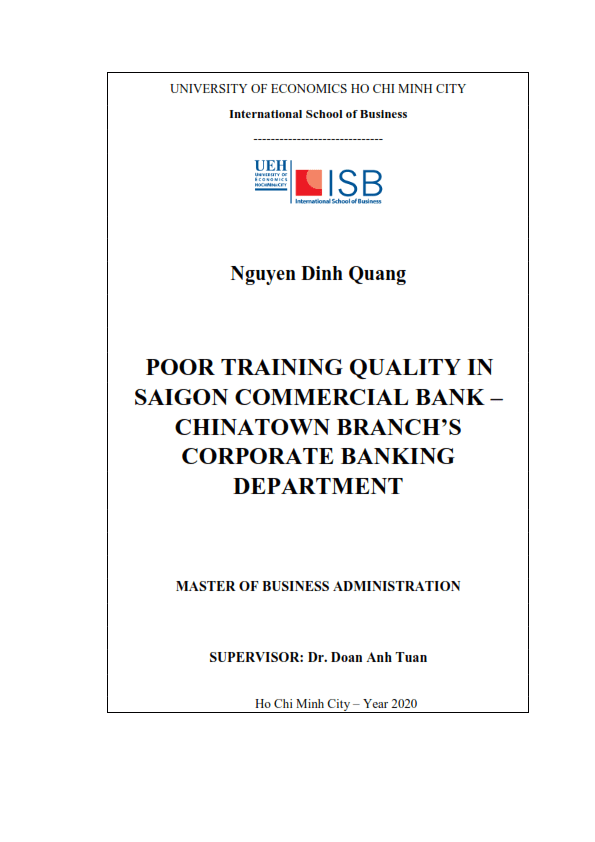- Giảm 10% phí tải tài liệu khi like và share website
- Tặng 1 bộ slide thuyết trình khi tải tài liệu
- Giảm 5% dịch vụ viết thuê luận văn thạc sĩ của Luận Văn A-Z
- Giảm 2% dịch vụ viết thuê luận án tiến sĩ của Luận Văn A-Z
Poor training quality in Saigon Commercial Bank– Chinatown Branch’s Corporate Banking Department
50.000 VNĐ
Download Master Thesis: Poor training quality in Saigon Commercial Bank– Chinatown Branch’s Corporate Banking Department
Download Master Thesis: Poor training quality in Saigon Commercial Bank– Chinatown Branch’s Corporate Banking Department
Banking industry nowadays has been witnessing a lot of development, enhancing on its technology and global competition within commercial banks. According to the strategy of expanding the market, Saigon Joint Stock Commercial Bank (SCB) has a vision to create more than 50 branches and agencies throughout Vietnam from 2020-2022, that means SCB significantly needs of a high quality training and huge personnel to effectively act the business plan. Training is considered as one of the most fundamental aspects of human interaction and for organizations, it has become the main tools for achieving their strategic competitiveness. More importantly, the quality of workforce within any departments plays a great role to the success and high profits of commercial banks nowadays.
Moreover, team co-operation also has been found to benefit companies’sustainability efforts and performances. Clearly, training is more likely to be successful if it is well-managed and well-concerned. However, SCB – Chinatown Branch’s Corporate Banking Department has been experiencing high turnover rate as well as low profits for many years due to poor quality of training for employees. The biggest problem of SCB – Chinatown Branch’s Corporate Banking Department is dealing with poor quality of training. This makes the new employees in the Corportate Banking Department do not catch the job requirements at once.
The quality of customer appraisals in this department is inefficient and causes bad debts increasing. Moreover, the lack of sales skills also leads to a considerable decrease in capital sales and credit. Low ability of working mostly leads to increasing pressure on employees and raising the rate of quitting job at the branch. Due to distinct limitations, this thesis expects to propose potential solutions to boost the quality of current training at SCB – Chinatown Branch’s Corporate Banking Department in particular and in SCB’s system in the whole country.
Firstly, the training has to set a specific and methodical plan, consistent with the working scheme of the staff.
Secondly, the training programs have to be established relying on actual requirements of work tasks.
Thirdly, the trainers are required to have deep professional knowledges and lots of practical experiences.
Finally, after each training course, it is more effective if there is an objective and general assessment of the quality of the deployed training course.
Therefore, the branch in particular and SCB’s whole system in general can learn from experience and thoroughly improve the quality of staff training.
Keywords: Banking, Personnel management, Bank employees, Personnel training, Employee training
ThS08.123_Poor training quality in Saigon Commercial Bank– Chinatown Branch’s Corporate Banking Department
| Nơi xuất bản | |
|---|---|
| Chuyên Ngành | |
| Loại tài liệu | |
| Năm | |
| Ngôn ngữ |















